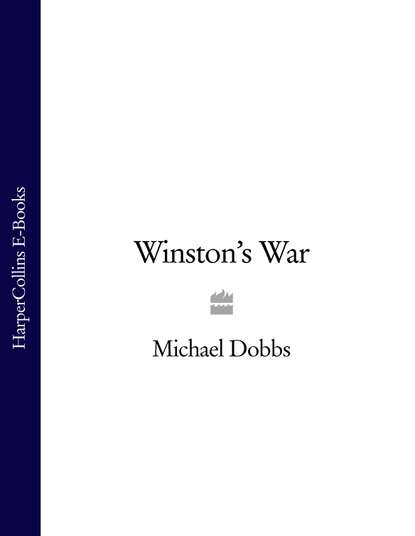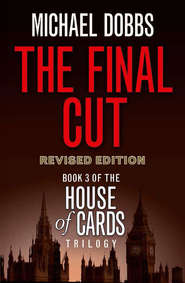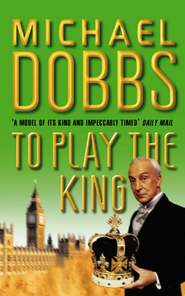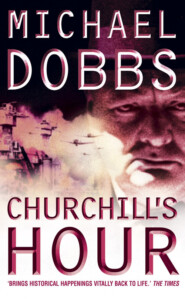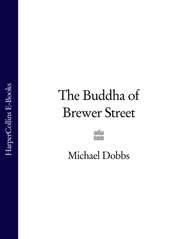По всем вопросам обращайтесь на: info@litportal.ru
(©) 2003-2024.
✖
Winston’s War
Настройки чтения
Размер шрифта
Высота строк
Поля
The shave and trim were finished, the moustache back in its proper place. The politician was ready to face the enemy. ‘Have a good day, sir,’ Mac said at the door, holding out his client’s freshly brushed hat.
The soon-to-be former great person barely heard. In his mind he was already on his feet making one of the most memorable resignation speeches of the age, a speech which might yet rock the Government, even bring its house down. He tried to ignore the worm that had been wriggling deep inside all morning and telling him that he should come to his senses, be realistic, understand that the most he could hope to achieve was to sway the House enough for the door to swing open and allow him back in.
‘I’ll be back,’ Cooper barked.
Mac declined to offer an opinion.
Guy Francis de Moncy Burgess woke badly. It was not a good place in which to wake badly. His apartment, in Chester Square near Victoria Station, was decorated with a deliberate taste for the grotesque – the carpet was red, the walls a murky white, the curtains and sheets beneath his heavy Italianate bed-head an uncertain blue, and everything covered with a film of nicotine. As he opened his eyes the colours and stale tobacco mounted a co-ordinated assault on him, and he groaned. His mouth felt like the bottom of a bird cage, and very soon he would be late. Again.
He slipped out of bed and stumbled to the window. On his way he knocked over a pile of books on which was balanced a glass of red wine. Fortunately the wine, like Burgess, had been almost completely consumed and the stain would be invisible amongst the rest. He threw open the window and lit a cigarette, coughing as a trickle of fresh air tried to penetrate the room. It was miserably squalid, but as he insisted on telling his friends, if this was squalor it was nothing compared to what you’d find in Guernica or some of the side streets of Moscow. So, you’ve been to Moscow, have you? they would invariably ask. How was it? Tough, uncompromising, intellectual, unsentimental, he would tell them. He would relate his encounter with a militiaman who had threatened to beat him up for walking on the grass, but that was only half the story. He’d been throwing up over a statue of Stalin at the time.
He flung the cigarette stub out of the window and hauled up a piece of dried fish that he kept dangling on a string from his windowsill, tearing off a piece before throwing the rest back out again. Breakfast on the run. But his mouth was so dry he couldn’t chew, not until he’d poured himself two fingers of Jameson’s and swilled it round the back of his gums.
‘To mastication,’ he murmured, raising his glass to the straw-stuffed Regency buck that stood by the wardrobe. It stared back at him in reproach, the glass eyes seeming to follow him around the room. Sometimes it seemed as if the whole world was after him, even the stuffed animals. The apartment was crammed with artefacts, from a frigate in a bottle to an old American harmonium that he occasionally played, nothing of any great value, all garbage really. One day he’d get rid of it, along with the rest of his ludicrous life. He rubbed whiskey with his finger round his teeth to get rid of the sour taste in his mouth. He always seemed to be drinking whiskey, more than he’d intended to, and more still to get rid of the hangover. He would chew garlic to get rid of the smell of whiskey, then drive ludicrously fast to see if he could get rid of all the things that bothered him. His friends said he’d kill himself eventually, and maybe they were right. It was amazing how many friends he had, all things considered.
It would be another one of those days. He would arrive late at Broadcasting House and they would shout at him, so he would shout back and yet again try to get them to use Churchill. He knew they would refuse, because they were under instructions from above. But in all the shouting about Churchill they would forget he looked like a tramp and had been late yet again. So he would have just one more drink to fortify himself and be on his way.
It was at that point that the eiderdown moved. It was piled high on one side of the bed, a tangle of old silk and cigarette burns, and out from beneath it protruded a calf, then a thigh, followed by the most gorgeous arse he’d seen since …? Since last night. Victoria Station, one of his habitual hunting grounds, where if ever he was stopped and questioned he could always argue that he was on his way home, just round the corner, officer. The arse moved. It belonged to a young bellboy from Claridge’s. He couldn’t remember his name. Which in the scramble last night hadn’t mattered a damn, but in the damp light of day seemed – well, unnecessarily rude. So Burgess decided he’d spend a little more time with his guest that morning, give himself the opportunity to find out the lad’s name. And if it made him still later at the BBC, what did it matter? The war would wait. That was official.
Brendan Bracken was one of those figures who could be described as many things, but mostly he was outrageous. He would also, soon, become one of the most powerful men in the country.
Bracken was a fantasist. He was also the Member of Parliament for North Paddington. He was Irish by birth but claimed to be an orphan from Australia where his parents had been killed in a bush fire. In fact, his father had been a stonemason and also a member of the Republican Brotherhood, an illegal Irish nationalist organization on whose behalf he would go round blowing up Anglo-Irish walls and buildings. The following day he would appear cheerfully on the doorstep and offer to repair them. Perhaps he passed on to his son the capacity for vivid imagination.
Bracken went through life lying about his origins, about his education – at times he would suggest he had gone to Oxford University – and even about his parentage. When he attached himself to Winston Churchill and worked his way up to become the elder man’s indispensable right arm, rumours began to circulate that he was Churchill’s illegitimate son. He did nothing to discourage these rumours, and perhaps even started them.
Bracken did more than invent the world around him, he invented many worlds and seemed to be able to move guilelessly from one to another. People knew it was largely nonsense, but the brashness and energy he devoted to his fantasies persuaded others to go along with them. It was so much easier than calling his bluff. By October 1938 he was thirty-seven years of age with a safe parliamentary seat and was being driven around in his own custom-built Bentley. Still he had trouble being taken seriously.
Yet he wanted so desperately to be taken seriously. Which was why, when he entered the Members’ Lobby beside the great oak doors leading to the chamber of the House of Commons and was greeted by Duff Cooper, he was deeply confused. For Duffie had been part of the team. Cooper had been Churchill’s drinking partner, dining companion and intimate colleague in the battle against Chamberlain and appeasement. It had been an awesome team, one of them inside the Cabinet, the other rampaging freely outside, but now it was all unravelling. Cooper, Churchill’s last great ally inside the corridors of power, was gone. Churchill was despondent. Whichever way Bracken looked at it and turned it over in his mind, Chamberlain had won.
‘Brendan,’ Cooper greeted him, taking him by the arm. ‘At last a friendly face. Beginning to feel about as popular as Dr Crippen standing here.’
‘Hello, Duffie. Glad I’ve been able to find you. Wanted you to know that we’re all behind you.’
‘Ah, words of comfort. Good, because that’s what I’d like. Would you come and sit beside me on the benches while I make my speech? You know, moral support. Someone to lean on when the old legs go a little wobbly.’
Instead of replying, Bracken produced a large handkerchief and with some care blew his nose. He was always complaining of sinus trouble. And it gave him time to manufacture his response.
‘Be honoured to, Duffie – but you know that’s not possible. Got to be on duty beside Winston.’
Churchill always took the same place on the green leather benches of the House, on the front row just a few feet along from where Government ministers themselves sat. Resignation speeches, by tradition, were made from farther back.
‘But surely on this one occasion …’ Cooper began to urge. A thread of steel had wrapped itself around his smile.
‘Duffie, you know what Winston’s like.’
‘My God, it’s like being abandoned on a desert island.’
Before he could continue his protest they were interrupted by a penetrating American voice with a distinctive Boston Irish twang.
‘Ah, the man of the moment. Not changed your mind, I hope.’
‘Your Excellency,’ Cooper responded, not even trying to contain his dislike. Joseph Kennedy, the United States Ambassador to the Court of St James’s, was one of the least diplomatic envoys ever provided by Washington. His admiration for the efficiency and ambition of the German Reich was as deep-rooted as the contempt he retained for the decaying, chaotic democracies of the Old World, and he took no trouble to hide either.
‘Brought along a couple of guests to see the performance. My son, Jack’ – he introduced a fresh-faced man in his early twenties, but looking younger – ‘and someone you may already know. Captain Charles Lindbergh.’ The aviator, the first man to fly the Atlantic alone and famed throughout the world, held out his hand.
‘I’m delighted you should think my performance worthy of such an audience, Joe. I’ll try not to disappoint.’
‘You already have, Duffie. If you’d had your way, you’d already be at war against Hitler. You might as well take a dip in a bath of acid.’
‘What did I tell you, Brendan. A veritable Dr Crippen.’
‘Look, ask Lindie here. He’s been telling me all about the Luftwaffe – and he knows, goddamn it. They can send up ten times the number of planes as you, the French and the Russians put together. His view is that in a shooting war London wouldn’t last a week – is that what you want?’
‘That’s what puzzles me, Joe. Here we are – according to you – totally without any option. And there was me thinking we’d won the last war.’
‘That’s where you Brits always get it wrong, Duffie. We won the last war. America bailed you out in ’17. Fifty thousand dead to prove it. Damned if we’re gonna do that again.’
‘We’d fight alone, if necessary.’
‘Fight! What the hell you got to fight with? Hitler’s got more planes, more tanks, more divisions, more everything.’ His finger was stabbing in the direction of Cooper’s waistcoat. ‘Hey, you know what happened to your English unemployment this month?’
Cooper, who wasn’t following the American’s train of thought, shook his head. ‘I’ve had other things on my mind …’
‘Through the goddamn roof. Again. Nearly two million. Your factories are closing down and producing nothing but cobwebs. Meanwhile the Fuehrer’s got his factories working to splitting point. Building the biggest army and air force this side of the Atlantic. Face it, Duffie, you guys’ve got about as much chance as a cock in a convent. What are you gonna do when the Wehrmacht comes marching down Whitehall? Throw cricket balls at ’em?’
A flush of anger had risen in Cooper’s cheeks. ‘And what will you do when he’s turned Europe into a dictatorship? When the world is dominated by Communism and Fascism? When America is cut off from its markets, without friends? When Hitler can hold you to ransom?’
Kennedy smiled coldly, not rising to the bait. He nodded towards the Chamber. ‘You’re gonna go in there and make a fool of yourself, Duffie.’
‘Stop pulling your punches, Joe.’
‘Hell, it’s not the time to pull punches with the situation in Europe.’
‘My point precisely.’
‘Then, as I said, it should be a fine performance. Damn fine. Gotta go claim our seats now. See you around.’ Then, in a final act of insult to the former First Lord, he turned to Bracken, who had remained silent throughout the exchange. ‘Nice talking with you, Mr Bracken. Come to dinner later in the week. I’ll give you a call.’
‘That would be splendid …’ Bracken replied, before realizing how insensitive he must have appeared to his parliamentary colleague. He turned to offer some words of remorse, but it was too late. He’d gone.
Duff Cooper had got it wrong. He wasn’t going to be alone on the benches. When he rose to make his resignation speech, the Government whips had ensured he was surrounded by a platoon of loyalists who saw it as their duty to make his moment in the parliamentary spotlight as uncomfortable as possible. By tradition resignation speeches are meant to be heard in silence and Hansard, the official record of parliamentary proceedings, is renowned for its inability to hear insults and inappropriate interruptions even if they ring round the ancient rafters. But The Times also published extensive verbatim extracts of parliamentary proceedings, and their report was unable to hide the crude treatment Cooper received at the hands of members of his own party.
They surrounded him, intimidated him, jeered and scoffed at him. Destroyed many friendships. Only when he mentioned the name of the Prime Minister did they cheer, then fell into sullen silence when he said that, no matter how he had tried, he couldn’t believe what the Prime Minister believed. ‘And so I can be of no assistance to him or his Government,’ Cooper continued, looking around him, eyes flooded with sorrow. ‘I should only be a hindrance.’ Growls of agreement began to rise about him like flood water. ‘It is much better that I should go.’ And Order Papers were waved like a breaking sea that threatened to wash him away. He stood in their midst like a rock, lonely, defiant, mouth dry as the abuse continued.
Yet gradually a hush fell. Perhaps his tormentors grew ashamed, or simply ran out of breath. In any event, Cooper’s dignity at last was allowed to shine through, without interruption.
‘I have forfeited a great deal. I have given up an office which I loved, work in which I was deeply interested and a staff of which any man might be proud. I have given up association in that work with my colleagues with whom I have maintained for many years the most harmonious relations, not only as colleagues but as friends. I have given up the privilege of serving as lieutenant to a leader whom I still regard with the deepest admiration and affection.’
He was looking directly at Chamberlain, who refused to return his stare.





